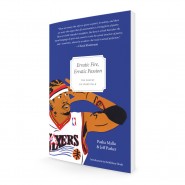
Book Review: Erratic Fire, Erratic Passion: The Poetry of Sportstalk by Pasha Malla and Jeff Parker

Erratic Fire, Erratic Passion: The Poetry of Sportstalk
Poems by Pasha Malla and Jeff Parker
Featherproof Books, October 2015
ISBN-13: 978-0983186342
$14.95; 142pp.
Reviewed by Danny Caine
Pasha Malla and Jeff Parker’s Erratic Fire, Erratic Passion is entirely composed of found-text quoting from myriad athletes’ on-the-record statements. Malla and Parker explain in an author note that the book is “a mash-up/remix/sampling project” and that they have “taken the same liberties with the source material as a DJ might.” But what to do when that source material draws chiefly from the recycled platitudes of athletic clichés? In his introduction, sportswriter Bethlehem Shoals muses on the clichéd banality of sports interviews, writing, “usually, athletes say what they think we want them to say, or what they’ve been told to say.” Yet, he adds, “underneath it all there’s a ghost in the clichés.” Malla and Parker seek this ghost in this ambitious and clever volume of poetry.
One ghost behind the clichés is the media itself. In Erratic Fire, Erratic Passion we see plenty of the people in front of the microphones but almost nothing of the people holding them. Still, the reporters cast a ghostly presence throughout. This is seen clearest in “Q&A,” a poem in the voice of notoriously-unkind-to-reporters coach Greg Popovich. While the poem’s “A’s” are all classic Popovich grumping, nothing follows the “Q’s” but blank space. The reporters are literally ghosts on the page. In “This is a Dirty Box Out,” one of three poems in basketball player Metta World Peace’s voice, World Peace says
I came here in
A Cookie Monster shirt
Because I wanted to,
And I was going
To wear the pants
But I thought you guys
Were going to judge me.
While we don’t see the reporters, they still linger as a ghostly presence ready to cast judgment.
This presence often shapes what the athletes themselves say; in “I AM BEAUTIFUL, FAMOUS, AND GORGEOUS” Malla and Parker twist Anna Kournikova’s own words to make her embody the media-driven stereotype that she’s nothing but her looks. In back-to-back Mike Tyson poems, Malla and Parker sample Tyson’s own words to craft two contrasting visions of the man himself: one is vulgar and cocky (“You’re not man enough to fuck with me.”) and the other is insecure and self-hating (“I hate Mike Tyson”). Throughout Erratic Fire, Erratic Passion, Malla and Parker, ghostly presences themselves, toy with how the ghost of the media can remix even the most banal platitudes into concrete athlete-selves ready for viewer/reader consumption.
At times in Erratic Fire, Erratic Passion, the media’s ghost fades and the folksy and sometimes bizarre philosophy of sports-think emerges. In “Bats and Trees,” NASCAR racer Brad Keselowski says “I think of racing— / and this is a little bit / of like Confucius / so just bear with me.” In “The Five Elements,” we learn about the five elements of successful Curling, and that “the nice thing about the five elements / is that you can put them into any delivery. / It really is a simplified way / of getting perfection.” A reader expecting the same old clichés might be surprised by how many distinct voices and philosophies emerge from Malla and Parker’s methods.
This book is not all clever experimentation. Almost all of these poems work well as poems despite their remix-y origins. Malla and Parker are apt to liken themselves to DJs if only for their attention to sound. In “From the Planet Lovetron,” basketball player Darryl Hawkins brags about his
Mama Shakin’
Rim Breakin’
Teeth Shakin’
Get-Out-the Wayin’
Backboard Swayin’
Game-Delayin’
If-You-Ain’t-Groovin-
You-Best-Get-Movin’
Dunk.
In “Cement Doesn’t Give as Much as Snow,” Shaun White speaks in a pantoum. Basketball player Rajon Rondo speaks in a poem called “Rajon: Rondeau.” Malla and Parker even poke and prod English itself, most often in the case of athletes who don’t speak it well. “Call Me Muni” alternates between choppy English (“I am study, yeah! / Thank you very much!”) with much more eloquent, presumably translated italicized sections like “It’s just that tomorrow / the field will be different.” The attention to language itself adds a third layer to the book. Tension exists between what the athlete wants to say and what the athlete thinks the reporter wants to hear, yes. But at times it also exists between what the athletes can say and what they cannot.
Language trickery peaks a few times when several voices merge and Malla and Parker present a poem with a group of indistinguishable narrators. This is put to powerful use in “Let the Thugs Play,” where a motley crew of recent on-the-record sports racists like Don Imus, Dan Snyder, and Donald Sterling speak their vitriol into a devastating satire. It’s just one of many notes that these skilled poetic DJs hit in this unique and surprising book. Erratic Fire, Erratic Passion sets out to find the poetry in sports talk. Through clever sampling and an attention to sound and form, Pasha Malla and Jeff Parker succeed.
Danny Caine‘s poetry has appeared in Mid-American Review, Hobart, Atticus Review, and New Ohio Review among others. He hails from Cleveland and lives in Lawrence, KS where he is co-editor of Beecher’s and works at Raven Bookstore. More info at dannycaine.com

Leave a Reply